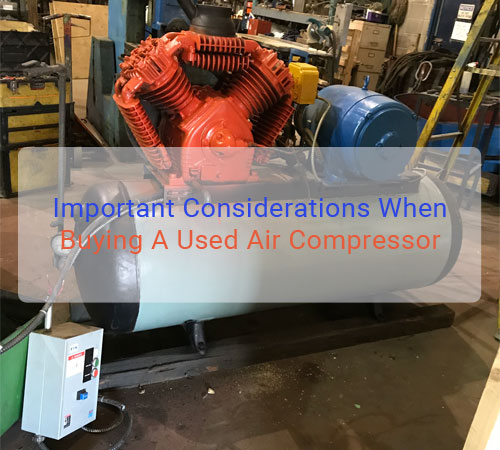As more and more small businesses find themselves priced out of buying a new air compressor, the market for used air compressors has exploded. For the most part, this is a good thing – it means that businesses can get the equipment they need without nearly going bankrupt in the process.
However, like any market for second hand goods, the sale of used air compressors is ripe for exploitation and there are unscrupulous individuals out there more than willing to deprive an unsuspecting business owner of their livelihood in order to make a quick buck!
Of course, that doesn’t mean that you should avoid buying a used air compressor altogether. There are plenty of bottom line pleasing bargains to be had out there, and with a bit of vigilance and research, you can avoid getting ripped off and end up with a quality bit of kit for a fraction of the cost.
Assess Your Own Needs
The first step to getting the best value for money when buying a used air compressor is assessing your own needs. You’ll need to have an idea of the kind of air output you’re going to need. You can determine this by looking at the power requirements for the tools and machinery you’re going to be using.
Aside from this, you’ll also need to think about whether you want a static or portable air compressor and also the standards of the industry you’re working in. Air compressors for use in a food production factory, for example, are required to meet a strict set of guidelines including the use of food grade oil.
Practical considerations such as the size of the compressor in relation to your workspace and the volume of noise it’ll make should also be at the forefront of your mind when picking a used air compressor.
It may be the case that the seller hasn’t listed this information, so it’s worth paying a visit to take a look at the machine beforehand or at the very least giving the current seller a call for the details.

Ask Plenty of Questions
Once you’ve determined your own requirements, you’re ready to begin your search. You can find used compressors listed on the internet or the classified sections of newspapers and trade magazines. Don’t forget that reputable dealers also stock a range of used air compressors (with quality guaranteed) either!
If you do choose to purchase a compressor over the internet or via an advert, make sure to either email or ring the buyer with questions before making any commitments to buy. You’ll want to determine why the seller is getting rid of the compressor – there’s plenty of plausible explanations, but it’s always worth being sure – as well as checking the age of the compressor as the older the compressor is, the less use you’ll get out of it.
Most importantly, ask to see a full service history of the compressor. Regular air compressor servicing is vital to the function of a machine, and a machine that hasn’t been serviced often is probably one to avoid. This will also help you see how well the compressor has performed over the years and any major problems it has faced – and any current problems it may have. It also helps to prove ownership, which helps you avoid any nasty legal wrangling should you accidentally purchase a stolen compressor.
Be Wary Of…
It’s vital to keep your wits about you when buying any used air equipment so if you get a bad feeling about something, look into it further. If you feel a compressor is too cheap, ask the seller why they’ve priced it that way – it could be they’re looking to make a quick sale to fund the purchase of new equipment, or it could be that they want to get rid of it as quickly as it doesn’t work!
Also be wary of picking up a broken compressor on the cheap with the intention of renovating it. This can be an extremely costly and time-consuming exercise which can actually end up costing you more in time and money in the long run than purchasing a brand new compressor. Unless you’re certain you can complete the job quickly and cheaply, don’t bother.
Of course, the best way to negate all this snooping around and detective work is to buy a used air compressor from a reputable dealer who guarantees all their compressors meet industry regulations and quality standards!
